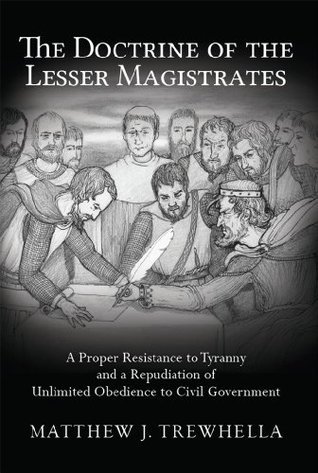What do you think?
Rate this book


135 pages, Kindle Edition
First published August 10, 2013
"The lesser magistrate doctrine declares that when the superior or higher civil authority makes unjust/immoral laws or decrees, the lesser or lower ranking civil authority has both a right and duty to refuse obedience to that superior authority. If necessary, the lesser authorities even have the right and obligation to actively resist the superior authority."When a lesser authority steps in and resists on behalf of the people, that is called interposition. Trewhella argues that this doctrine has been lost in modern times, but that it has played an essential role in the history of Western Civ. The doctrine was officially articulated and formalized in 1550, when a bunch of Lutheran pastors in Germany expressed philosophically and theologically principled resistance to Catholic abuses, but the practice existed for centuries long before that, including in ancient Rome. In American history, an example of interposition was the protection that citizens and local magistrates in the Dred Scott era provided to runaway slaves in direct defiance of the federal government. We live in a time where government abuse of power is becoming increasingly dangerous, argues Trewhella, and the lesser magistrates (states, sheriffs, etc) have a responsibility to defy illegal tyrannies and protect the people. In other words, when laws are unjust, they are invalid. Not only must they be ignored, but they must be actively resisted.
"Lesser magistrates today need to understand that state governments were not intended to be mere conduits for enacting Federal public policies. They are not to be mere implementation centers through which the Federal government dispenses its unjust policies, decisions, and laws."Trewhella is a conservative Christian, and so his most egregious examples of government tyranny involves such hot-button issues as the Supreme Court's decisions on abortion and homosexuality. He spills a lot of (digital) ink arguing for a Biblical definition of political authority and responsibility, and he repeatedly states that government is supposed to enforce God's law. But it was never clear to me where he draws the line between sins and crimes. Obviously there will be some overlap--murder is both a sin and a crime. But what about hatred? What about mean-spirited speech that is also protected by law? It's not as simple as saying "government must adhere to God's law." This muddiness was the biggest complaint I had with the book. Perhaps Trewhella does have a more robust, fleshed out understanding of the ways Biblical moral law informs civil government in practice, but he doesn't get into it here. I'm not sure how convincing anything in this book will be to anyone other than conservative Christians who already agree with him. The book also could have been about half as long; he just kept repeating the same points.
"The standard is that if a law enacted by the State contravenes the law or Word of God, we are to obey God, not the State."
"The lesser magistrate doctrine declares that when the superior or higher civil authority makes unjust/immoral laws or decrees, the lesser or lower ranking civil authority has both a right and duty to refuse obedience to that superior authority. If necessary, the lesser authorities even have the right and obligation to actively resist the superior authority."